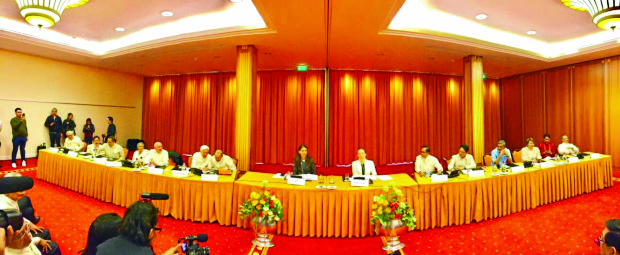Peace train

Peace talks between the government and the communist-led National Democratic Front of the Philippines formally open at Radisson Blu Palace Hotel in Noordwijk, The Netherlands. —CONTRIBUTED PHOTO
The once seemingly unstoppable train to peace with the longest running communist insurgency in the world is limping out of its fourth station on the new route—delayed by a day, dragged down by issues of bad faith and unkept promises, disturbed by new questions about ultimate direction.
But the important thing—to borrow a metaphor close to President Duterte’s railway-obsessed heart—is that it is back on track. It is still not picking up pace as it should, the rail line ahead needs to be tested for signs of strain, the list of stations to stop at remains dauntingly long. But at least the fourth round of negotiations in Europe, hosted by the Dutch government, is finally underway.
Several weeks ago President Duterte threw a spanner into the works, causing the train to sputter to a halt. The scale and surprising swiftness of the change almost caused a derailing of the peace talks; the negotiators of the National Democratic Front were disoriented and—the candid truth—the government’s own negotiators were also caught by surprise. Can the peace negotiations survive what appears to be President Duterte’s change of heart?
The answer depends in part on whether what has happened since was merely a change of tactics on the part of the government, but not of strategy. In this view, the President has had to reconsider and recalibrate his public approach to the negotiations because of increasing resistance from within the defense department and the military. Still smarting from the decision to release Benito and Wilma Tiamzon to allow them to serve in their role as NDF peace consultants, the security establishment had grown wary of the many concessions the Duterte administration has granted the communist movement.
Candid as always, the President admitted that he could no longer follow through on his promise to release hundreds of political prisoners because it would mean he would have fewer cards left to play with, in the protracted negotiation. Last Sunday, he outlined a set of four conditions—what he called his “barest conditionalities”—which he said needed to be met before the peace talks can resume. These include a signed bilateral declaration of a permanent ceasefire (“a signed official document”), the end of the NPA practice of collecting so-called revolutionary taxes (“no extortion or revolutionary tax”), the recognition by the communist movement that it cannot in fact claim any territory in the country as its own (“That’s crazy”), and the release by the NPA of all its prisoners. “This fight has been going on for the last 50 years. I hate it.”
Are these barest conditionalities meant, not to deny the communist movement the space in which to move, but rather to enable the Duterte administration to find the elbow room for negotiation? It is negotiating with the views of the security establishment in mind. Instead of concessions, it would come back to the peace table with these conditions, confident that the aging leaders of the communist movement will also return to the table. That is one view.
But the answer also depends in part on whether President Duterte has come to a different realization about the true nature of the communist insurgency. In this view, the increasingly audacious excursions by the New People’s Army into non-conflict zones led to the decisive moment when Mr. Duterte, who describes himself as a socialist and a longtime friend of the NPA rebels in his area, finally saw the insurgency for what it is—as antithetical to the government he now heads. As city mayor, he could afford to allow a massive funeral march for an NPA leader. As president and commander in chief, he would be courting possible impeachment.
But whether the new realities that have transformed the most optimistic cycle of the on-again, off-again peace negotiations into what chief government peace negotiator Silvestre Bello now calls “very difficult and exacting” talks were triggered by a change in the President’s tactics, or a change in his overall strategy, the fact remains that negotiations are the most certain road to a lasting peace. We should support the ongoing round of talks, and hope for a successful outcome.















